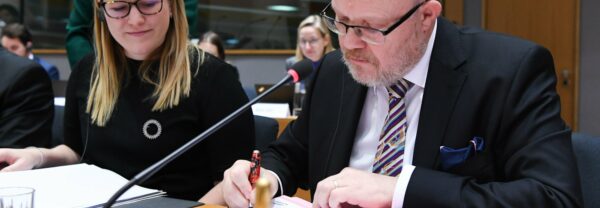“EU must do more on prostate cancer”
The event was due to take place in Brussels to mark the Croatian Presidency of the Council of the European Union, but had to move to a virtual format due to the public health challenges of COVID-19.
The event was due to take place in Brussels to mark the Croatian Presidency of the Council of the European Union, but had to move to a virtual format due to the public health challenges of COVID-19.
First, Prof. Hein Van Poppel (BE) was asked to set the scene on the EU policy landscape and the current scientific opinion. The Innovative Partnership for Action Against Cancer (iPAAC), an EU Joint Action of the Ministries of Health funded by the EU Health Programme, has recently called for more clinical trials on prostate cancer screening, but Prof. Van Poppel said there is no need for more clinical trials as it is already clear from the results of large-scale trials that screenings are effective. Before the PSA blood test became available, up to a half of the prostate cancer patients died of the disease. Since PSA was introduced to detect prostate cancer at an early stage, the mortality from prostate cancer has decreased more dramatically than from any other cancer, at the cost however of overdiagnosis and overtreatment. These two issues have historically been the biggest factors against PSA testing.
Algorithm
The main advantage of PSA testing is that men at a higher risk of PCa are more likely to get an early diagnosis and may need less aggressive treatment. The treatment of late stages of the disease is extremely expensive and will only prolong life for two years on average, with a poor quality of life.
Over the years, the EAU has produced gold-standard, multidisciplinary guidelines, which means that the issues of overtreatment and overdiagnosis need no longer to be a barrier to a decent PCa early detection strategy being put in place. In fact, such a strategy can be seen in figure 1: the algorithm for early detection of prostate cancer, which has been developed as part of the EAU’s new White Paper on prostate cancer.
Figure 1: The algorithm for early detection of prostate cancer, which has been developed as part of the EAU’s new White Paper on prostate cancer (please click on the figure to enlarge)
The bottom line is that early detection of prostate cancer in well-informed men saves lives, improves quality of life and reduces costs for health care systems. There is hope for getting this overlooked condition on the EU agenda as the EU launched a consultation on a new EU cancer plan, with the possibility of adding early detection of prostate cancer to the initiatives that the European Commission can support.
Mission on Cancer
Later into the session, Mr. Jan-Willem Van de Loo (BE) from the Directorate-General for Research and Innovation of the European Commission gave an update on the initiatives that will be taken up by the Commission. He highlighted the EU cancer plan and also the research “Mission on Cancer,” which is a new concept in Europe and will be funded through the EU’s future research and innovation programme (Horizon Europe). The Mission on Cancer will complement the activities of the cancer plan.
Van de Loo is closely involved in the preparations for this mission, which is prepared under the guidance of a board. A discussion paper will be ready by April or May, when it will be shared and be up for discussion with all stakeholders, of which the EU citizens are key. Horizon Europe will have a strategy for continuous engagement with EU citizens and missions are key parts in this engagement process. Due to COVID-19, most of the interaction will be online in the coming months.
Prof. Anders Bjartell (SE) followed Mr. Van de Loo by presenting the Scandinavian experience with early detection. His evidence concurred with the evidence presented in Prof. Van Poppel’s introduction. Between 2009 and 2018, more men with low-risk cancer were managed with active surveillance in Sweden.
Prof. Bjartell also went on to explain the PIONEER big data project that is coordinated by the EAU for better outcomes of prostate cancer. This data can be used, for example to identify the best algorithm to reduce overdiagnosis as this has been done for the algorithm depicted in figure 1.
Innovative screening practices
Dr. Erik Briers (BE), who spoke on behalf of Europa Uomo, gave the patients perspective, particularly focussing on elements of risks to patients, which are predominantly elated to a lack of complete information on prostate cancer, which is why he is passionate about the EAU Patient Information work.
"The EAU will continue to push the EU to achieve more in the fight against prostate cancer."
Prof. Maria Ribal (ES), vice-chair of the EAU Guidelines Office and head of the uro-oncology unit at the hospital clinic of the University of Barcelona (ES), gave a clear and precise final presentation on the innovative screening practices taking place in her clinic, where screening tools are used in a more clever way, as a result of which quality of life has increased and the mortality of her patients has reduced.
More must be done
Prof. N’Dow concluded the session saying that more can and must be done for those impacted by prostate cancer across Europe and that the EU cancer plan offers a unique opportunity for this gap to be addressed. It is too early to say exactly how prostate cancer will be addressed by either the mission or the EU cancer plan, but the EAU will continue to push the EU to achieve more in the fight against prostate cancer, for instance by informing and mobilising members to engage with debates which will have an impact on this disease.
Download White Paper
In order to respond to the consultation on the EU Cancer Plan, the EAU has joined forces with Movember, Europa Uomo, the European Cancer Patient Coalition and the European Alliance of Personalised Medicine to update its 2017 White Paper on Prostate Cancer. This updated White Paper gives recommendations on how the EU Cancer Plan can tackle Prostate Cancer, the most frequent cancer in Europe, with around 450 000 men diagnosed every year.



